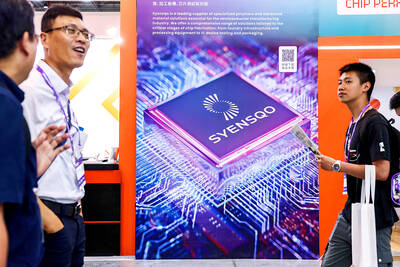LINE Biz+ Taiwan Ltd (連加網路) and iPass Corp (一卡通票證) yesterday announced that they would be forming a cross-border mobile payment alliance with four regional peers: Japan-based Line Pay Corp, Thailand-based Rabbit Line Pay Co Ltd, and South Korea-based Naver Corp and NHN Payco Corp.
The collaboration would enable the companies’ 78 million users to make electronic payments at stores that accept Line Pay, Naver Pay, Payco or Rabbit Line Pay, LINE Biz+ Taiwan said.
“We noticed that Japanese, [South] Koreans, Thais and Taiwanese visit to each others’ countries frequently. Our cooperation would save them time and trouble with foreign exchanges,” the firm said.
That would benefit the payment operators’ partnered stores as well, as they would be able to market their products or services to more clients, it said.
LINE Biz+ Taiwan and Naver Pay have partnered with more than 164,000 stores in Taiwan and 250,000 stores in South Korea respectively, while other payment operators also have abundant corporate clients, as they are popular among customers, LINE Biz+ Taiwan marketing business head Vincent Yeh (葉君毅) told a news conference in Taipei.
Customers would not need to download new mobile apps or register another app, as the apps offered by the six operators would be connected automatically, LINE Biz+ Taiwan said.
For instance, Taiwanese would be able to purchase goods in South Korea using Line Pay at stores that accept Payco or Naver Pay after scanning a QR code with their mobile phones, while South Korean or Thai tourists could pay in Taiwan using their own mobile payment services, the firm said.
Like overseas credit card spending, customers would need to pay a handling fee for each overseas transaction, but LINE Biz+ Taiwan and iPass would negotiate with banks to reduce the handling fee, iPass senior assistant vice president Wang Jiun-ping (王俊平) said.
Unlike credit cards, Taiwanese using electronic payment services would only pay in New Taiwan dollars when making purchases abroad, Wang said, adding that the service would automatically convert the currencies at the real exchange rate.
The service would be launched in Taiwan for travelers from Japan, South Korea and Thailand in the first quarter of next year, while people traveling from Taiwan to the three countries would need to wait longer to use the service, Wang said.
NHN Payco, the only company among the four not affiliated with Naver, expects to attract more foreign clients through the alliance, while it has an advantage in offline marketing compared with its counterpart Naver Pay, director Choi Myung-hwan told the Taipei Times.

SEMICONDUCTOR SERVICES: A company executive said that Taiwanese firms must think about how to participate in global supply chains and lift their competitiveness Taiwan Semiconductor Manufacturing Co (TSMC, 台積電) yesterday said it expects to launch its first multifunctional service center in Pingtung County in the middle of 2027, in a bid to foster a resilient high-tech facility construction ecosystem. TSMC broached the idea of creating a center two or three years ago when it started building new manufacturing capacity in the US and Japan, the company said. The center, dubbed an “ecosystem park,” would assist local manufacturing facility construction partners to upgrade their capabilities and secure more deals from other global chipmakers such as Intel Corp, Micron Technology Inc and Infineon Technologies AG, TSMC said. It

EXPORT GROWTH: The AI boom has shortened chip cycles to just one year, putting pressure on chipmakers to accelerate development and expand packaging capacity Developing a localized supply chain for advanced packaging equipment is critical for keeping pace with customers’ increasingly shrinking time-to-market cycles for new artificial intelligence (AI) chips, Taiwan Semiconductor Manufacturing Co (TSMC, 台積電) said yesterday. Spurred on by the AI revolution, customers are accelerating product upgrades to nearly every year, compared with the two to three-year development cadence in the past, TSMC vice president of advanced packaging technology and service Jun He (何軍) said at a 3D IC Global Summit organized by SEMI in Taipei. These shortened cycles put heavy pressure on chipmakers, as the entire process — from chip design to mass

People walk past advertising for a Syensqo chip at the Semicon Taiwan exhibition in Taipei yesterday.

NO BREAKTHROUGH? More substantial ‘deliverables,’ such as tariff reductions, would likely be saved for a meeting between Trump and Xi later this year, a trade expert said China launched two probes targeting the US semiconductor sector on Saturday ahead of talks between the two nations in Spain this week on trade, national security and the ownership of social media platform TikTok. China’s Ministry of Commerce announced an anti-dumping investigation into certain analog integrated circuits (ICs) imported from the US. The investigation is to target some commodity interface ICs and gate driver ICs, which are commonly made by US companies such as Texas Instruments Inc and ON Semiconductor Corp. The ministry also announced an anti-discrimination probe into US measures against China’s chip sector. US measures such as export curbs and tariffs